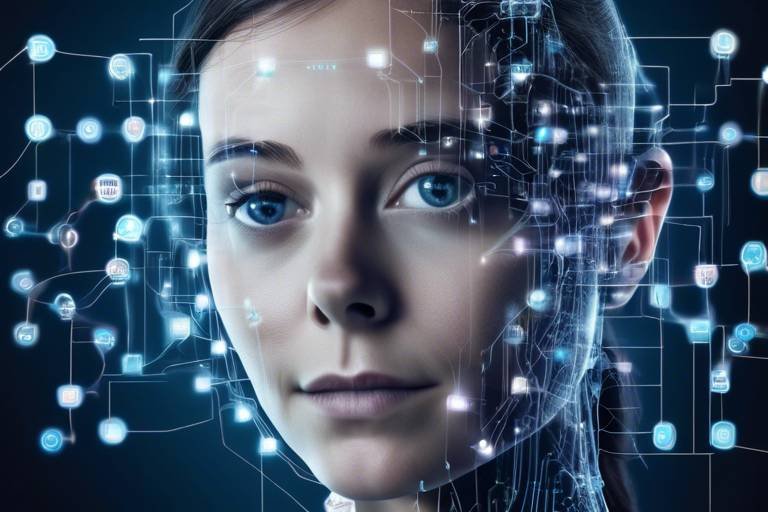The Rising Importance of AI in Mental Health
In recent years, the intersection of technology and healthcare has been a hot topic, with artificial intelligence (AI) emerging as a game-changer in various fields. Among these, mental health care stands out as a domain ripe for transformation. Imagine a world where mental health professionals have powerful tools at their disposal, enabling them to diagnose and treat patients more effectively than ever before. That's the promise of AI in mental health. This article explores the transformative impact of artificial intelligence on mental health care, highlighting its benefits, challenges, and future potential in improving patient outcomes and accessibility.
AI is not just a buzzword; it's a revolution. From chatbots providing immediate support to algorithms analyzing complex data sets, the integration of AI into mental health practices is reshaping how care is delivered. But what does this mean for patients and practitioners? Well, it means enhanced diagnostics, personalized treatment plans, and an overall improvement in the quality of care. It's like having a supercharged assistant who never sleeps, always ready to analyze data and provide insights that can lead to better decision-making.
However, the road to fully integrating AI into mental health care is not without its bumps. There are significant challenges that need to be addressed, such as data privacy concerns and ethical dilemmas surrounding AI's decision-making processes. As we delve deeper into this topic, we'll uncover both the bright prospects and the potential pitfalls of AI in mental health. So, buckle up as we explore this fascinating intersection of technology and mental wellness!
To truly appreciate the impact of AI on mental health, we first need to understand what AI is and how it operates. At its core, artificial intelligence refers to the simulation of human intelligence processes by machines, especially computer systems. This includes learning, reasoning, and self-correction. In the context of mental health, AI can analyze vast amounts of data—from patient histories to treatment outcomes—much faster than a human ever could.
One of the most exciting aspects of AI in mental health is its ability to enhance diagnostics. With AI tools, practitioners can sift through patient data more efficiently, leading to earlier detection of mental health disorders. Imagine a scenario where a patient walks into a clinic, and within minutes, a sophisticated AI system has already analyzed their symptoms and provided insights into possible conditions. This not only saves time but also allows for more accurate assessments, paving the way for tailored interventions that meet individual needs.
Now that we have a grasp on what AI is, let's dive into the myriad benefits it brings to mental health care. First and foremost, AI enhances patient engagement. With chatbots and virtual assistants, patients can access support whenever they need it, breaking down barriers that often prevent individuals from seeking help. This is particularly crucial in mental health, where timely intervention can make all the difference.
AI tools are revolutionizing diagnostics by analyzing patient data more efficiently, leading to earlier detection of mental health disorders and more accurate assessments for tailored interventions. For instance, AI algorithms can identify subtle patterns in patient behavior that might go unnoticed by human eyes. This level of analysis is akin to having a magnifying glass that reveals hidden details, allowing clinicians to make informed decisions based on comprehensive data.
Through predictive analytics, AI can identify patterns in patient behavior, enabling clinicians to anticipate crises and intervene proactively. This is crucial for conditions like depression or anxiety, where early intervention can prevent escalation. By recognizing warning signs before they manifest into a crisis, AI acts as a safety net, catching patients before they fall.
Natural language processing (NLP) allows AI to interpret patient conversations, providing insights into emotional states and mental health trends that can inform treatment strategies. Imagine a therapist having access to an AI that can analyze the nuances of a patient's speech, capturing emotions that might be difficult to articulate. This can lead to a deeper understanding of the patient's needs and more effective treatment plans.
AI's ability to analyze vast amounts of data facilitates the development of personalized treatment plans, catering to individual patient needs and preferences for more effective care. It's like having a tailored suit made just for you, as opposed to off-the-rack options that may not fit quite right. With AI, mental health care becomes more individualized, ensuring that each patient receives the attention and treatment they truly deserve.
Despite its potential, the integration of AI in mental health care faces challenges such as data privacy concerns, ethical considerations, and the need for clinician training to effectively use these technologies. Let's explore these challenges further.
The use of AI in mental health raises significant concerns regarding patient data privacy and security, necessitating robust measures to protect sensitive information and ensure compliance with regulations. After all, no one wants their personal struggles laid bare for the world to see, right? It’s essential that healthcare providers implement stringent security protocols to safeguard patient data.
Ethical dilemmas arise with AI's role in mental health, including issues of consent, bias in algorithms, and the potential for dehumanization in patient-provider interactions. As we embrace these technologies, we must also ensure that they enhance, rather than replace, the human touch that is so vital in mental health care.
Looking ahead, the future landscape of mental health care is promising. AI technologies will continue to evolve, enhancing both accessibility and effectiveness in treatment options for diverse populations. As we navigate this uncharted territory, it's crucial to remain mindful of the ethical implications and strive for a balance between technology and human connection.
- How is AI currently being used in mental health care? AI is used for diagnostics, personalized treatment plans, and patient engagement through chatbots and virtual assistants.
- What are the main benefits of AI in mental health? AI enhances diagnostics, provides personalized treatment, and improves patient engagement.
- Are there risks associated with AI in mental health? Yes, there are concerns regarding data privacy, ethical considerations, and the need for proper clinician training.
- What does the future hold for AI in mental health? The future looks promising, with continued advancements in technology aimed at improving patient care and accessibility.

Understanding AI in Mental Health
Artificial Intelligence (AI) is not just a buzzword; it's a revolutionary force reshaping various sectors, including mental health care. At its core, AI refers to the simulation of human intelligence processes by machines, particularly computer systems. This encompasses learning, reasoning, and self-correction. When we talk about AI in the context of mental health, we're looking at a blend of advanced algorithms and data analytics that can significantly enhance how mental health professionals diagnose and treat their patients. Imagine having a personal assistant that can analyze vast amounts of data, spotting patterns and trends that might be invisible to the naked eye. That's the power of AI!
The integration of AI into mental health practices is not just about replacing human interaction; it's about augmenting it. For instance, AI tools can analyze patient data—ranging from clinical notes to social media activity—providing insights that help clinicians make informed decisions. These tools can identify early warning signs of mental health issues, allowing for timely interventions. Moreover, AI can assist in developing tailored treatment plans that resonate with individual patient needs, making care more effective and personalized.
To give you a clearer picture, let’s break down some of the key areas where AI is making waves in mental health:
- Diagnostics: AI systems can sift through patient data and identify potential mental health disorders much faster than traditional methods.
- Continuous Monitoring: Wearable devices and mobile applications powered by AI can monitor a patient’s mood and behavior in real-time, providing valuable feedback to both the patient and their therapist.
- Accessibility: AI-driven platforms can offer support to individuals who may not have easy access to mental health professionals, breaking down geographical and financial barriers.
In essence, the understanding of AI in mental health is about recognizing its potential to enhance the therapeutic process. It’s not about replacing the human touch—something that is crucial in mental health care—but rather about creating a synergy between technology and human empathy. As we continue to explore this fascinating intersection, the possibilities for improving patient outcomes and accessibility are boundless.
As we venture deeper into this exciting field, it’s essential to remain mindful of the ethical considerations and challenges that accompany such advancements. The journey of integrating AI into mental health care is just beginning, and with it comes a promise of innovation that could change lives for the better.

Benefits of AI in Mental Health Care
Artificial Intelligence (AI) is not just a buzzword; it's a game changer in the realm of mental health care. Imagine a world where mental health professionals can leverage technology to enhance their practice, improve patient outcomes, and create a more engaging experience for patients. Sounds revolutionary, right? Well, that's exactly what AI is bringing to the table. From personalized treatment plans to enhanced diagnostics, AI is transforming how we approach mental health.
One of the most significant advantages of AI in mental health care is its ability to improve patient engagement. Traditional methods of therapy can sometimes feel disconnected, but AI tools can bridge that gap. For instance, chatbots and virtual assistants are available 24/7, offering support and resources to patients whenever they need them. This constant accessibility can encourage individuals to seek help sooner and stay committed to their treatment plans. It's like having a supportive friend who’s always there to lend an ear!
Furthermore, AI enables the creation of personalized treatment plans. By analyzing vast amounts of data—from clinical histories to behavioral patterns—AI can help mental health professionals tailor interventions to meet the unique needs of each patient. This customization can lead to more effective treatments, as patients are more likely to respond positively when their care is designed specifically for them. It's akin to having a bespoke suit tailored just for you, rather than a one-size-fits-all approach.
Another remarkable benefit of AI in mental health care is its role in enhanced diagnostics. AI tools excel at analyzing complex datasets, which allows for earlier detection of mental health disorders. For example, algorithms can assess patterns in patient data that might go unnoticed by human eyes. This capability leads to more accurate assessments and timely interventions, which can significantly improve patient outcomes. Imagine catching a problem before it escalates—AI makes that possible!
Through predictive analytics, AI can identify patterns in patient behavior that clinicians might not recognize. By examining historical data, AI can forecast potential crises, enabling mental health professionals to intervene proactively. This predictive capability is akin to having a weather forecast for mental health; it allows for preparation and action before a storm hits, ultimately fostering a safer environment for patients.
Moreover, AI's use of natural language processing (NLP) is revolutionizing how we understand mental health. NLP allows AI systems to interpret patient conversations and written communication, providing valuable insights into their emotional states. This analysis can inform treatment strategies and help professionals understand trends in mental health that might otherwise remain hidden. It’s like having a magnifying glass to spot the nuances in human emotions!
In conclusion, the benefits of AI in mental health care are vast and multifaceted. From enhancing diagnostics to creating personalized treatment plans, AI is paving the way for a future where mental health care is more effective and accessible than ever. As we continue to explore and harness the potential of AI, we can expect to see even more innovative solutions that will reshape the landscape of mental health care.
- How does AI improve patient engagement?
AI tools like chatbots provide 24/7 support, ensuring patients have access to resources and guidance whenever they need it. - What are personalized treatment plans?
These are tailored interventions based on individual patient data, ensuring that care is specific to each person's needs. - Can AI help in diagnosing mental health disorders?
Yes, AI can analyze complex data to identify patterns and detect disorders earlier than traditional methods. - What is predictive analytics?
This involves using historical data to forecast potential crises in patients, allowing for proactive interventions.

Enhanced Diagnostics
The landscape of mental health diagnostics is undergoing a remarkable transformation, thanks to the integration of artificial intelligence. Imagine a world where mental health disorders can be detected with the same precision as a physical ailment. AI tools are stepping into this realm, revolutionizing how we understand and approach mental health diagnostics. By leveraging advanced algorithms and machine learning techniques, AI can analyze patient data at an unprecedented scale and speed. This capability allows for earlier detection of disorders, which is crucial in a field where timely intervention can drastically alter outcomes.
One of the most exciting aspects of AI in diagnostics is its ability to sift through vast amounts of data to uncover patterns that may not be immediately visible to human practitioners. For instance, AI systems can analyze electronic health records, social media activity, and even wearable device data to provide a comprehensive picture of a patient's mental health status. This holistic approach enables clinicians to make more informed decisions, leading to tailored interventions that resonate with individual patient needs.
Moreover, AI's enhanced diagnostic capabilities are not limited to just identifying disorders. They also facilitate more accurate assessments of the severity and progression of conditions. For example, an AI tool might analyze a patient's speech patterns during therapy sessions, identifying subtle changes that could indicate a shift in their mental health. This level of detail empowers mental health professionals to adjust treatment plans proactively, ensuring that patients receive the most effective care possible.
To illustrate the impact of AI on diagnostics, consider the following table that outlines the traditional diagnostic methods versus AI-enhanced approaches:
| Aspect | Traditional Methods | AI-Enhanced Methods |
|---|---|---|
| Data Analysis | Manual review of patient history and symptoms | Automated analysis of diverse data sources |
| Detection Speed | Time-consuming, often delayed | Rapid identification of patterns and anomalies |
| Precision | Subjective assessments by clinicians | Data-driven insights with higher accuracy |
| Patient Monitoring | Periodic check-ups | Continuous monitoring through wearables and apps |
In conclusion, the integration of AI in enhanced diagnostics is not just a technological advancement; it's a paradigm shift in how we approach mental health care. With the ability to analyze complex data sets and detect disorders earlier, AI is proving to be a game-changer in improving patient outcomes. As we embrace these innovations, the potential for more effective, personalized care becomes not just a possibility but a reality.
- How does AI improve mental health diagnostics?
AI enhances diagnostics by analyzing large datasets to identify patterns and anomalies that human clinicians might miss, leading to earlier and more accurate diagnoses. - Are there risks associated with AI in mental health?
Yes, there are concerns regarding data privacy, ethical considerations, and the need for proper clinician training to use these technologies effectively. - Can AI replace mental health professionals?
No, AI is designed to assist professionals, not replace them. It provides valuable insights that can enhance the decision-making process.

Predictive Analytics
Predictive analytics is like having a crystal ball for mental health care. It allows clinicians to look into the future by analyzing historical data and identifying patterns that may indicate potential crises. Imagine being able to predict when a patient might experience a mental health setback and intervening before it escalates. This proactive approach not only enhances patient outcomes but also fosters a more supportive environment for individuals grappling with mental health issues.
The core of predictive analytics lies in its ability to sift through vast amounts of data—from patient histories to behavioral trends—and extract meaningful insights. By utilizing advanced algorithms and machine learning techniques, AI can process information at lightning speed, uncovering correlations that might go unnoticed by human practitioners. For example, it can analyze factors such as medication adherence, social interactions, and even sleep patterns to predict potential relapses or crises.
Moreover, predictive analytics can be particularly beneficial in identifying high-risk patients who may require more intensive monitoring or intervention. By categorizing patients based on their risk levels, mental health professionals can allocate resources more effectively, ensuring that those who need help the most receive it in a timely manner. This targeted approach not only optimizes care but also enhances the overall efficiency of mental health services.
To illustrate the impact of predictive analytics in mental health care, consider the following table:
| Predictive Factors | Potential Outcomes |
|---|---|
| Medication Non-Adherence | Increased risk of relapse |
| Social Isolation | Higher likelihood of depressive episodes |
| Sleep Disturbances | Potential for anxiety escalation |
In addition to improving individual patient care, predictive analytics contributes to a broader understanding of mental health trends within populations. By aggregating data from multiple sources, mental health organizations can identify emerging issues, allowing them to adapt their strategies and resources accordingly. This capability is crucial in a world where mental health challenges are on the rise, and timely interventions can make a significant difference.
While the benefits of predictive analytics in mental health care are clear, it is essential to approach its implementation thoughtfully. Clinicians must be trained to interpret the data accurately and integrate it into their practice without losing the human touch that is so vital in mental health care. After all, behind every data point is a person with unique experiences and emotions. Striking the right balance between technological advancement and compassionate care will be key to harnessing the full potential of predictive analytics in mental health.
- What is predictive analytics in mental health? Predictive analytics in mental health involves using data analysis techniques to forecast potential mental health crises based on historical patient data.
- How does predictive analytics improve patient care? It allows for early intervention by identifying high-risk patients and predicting potential relapses, which can lead to more effective and personalized treatment plans.
- Are there any risks associated with predictive analytics? Yes, there are concerns regarding data privacy, the potential for bias in algorithms, and the need for clinicians to interpret the data responsibly.

Natural Language Processing
Natural Language Processing (NLP) is a fascinating branch of artificial intelligence that focuses on the interaction between computers and humans through natural language. Imagine having a conversation with your therapist, but instead of a human, it’s an AI that understands your feelings and thoughts just as well. Sounds surreal, right? But this is precisely what NLP aims to achieve in the realm of mental health care.
NLP technology can analyze the words you use and the context in which you express them, providing valuable insights into your emotional state. For instance, when a patient discusses their feelings, NLP algorithms can detect nuances in their language—such as sentiment, tone, and even underlying themes that might not be immediately apparent to a human listener. This capability allows for a deeper understanding of a patient's mental health, leading to more informed treatment strategies.
One of the remarkable aspects of NLP is its ability to process vast amounts of unstructured data, such as text from therapy sessions, social media posts, or even journal entries. By analyzing this data, AI can identify patterns that may indicate a change in a patient’s mental health status. For example, if a patient frequently uses negative language or expresses feelings of hopelessness, NLP can flag these changes for the clinician’s attention.
Additionally, NLP can facilitate real-time feedback during therapy sessions. Imagine a scenario where an AI tool listens to a conversation between a therapist and a patient. It could provide the therapist with immediate insights, such as highlighting areas where the patient seems particularly distressed or suggesting follow-up questions that could deepen the conversation. This can enhance the therapeutic experience, making it more responsive and tailored to the patient’s needs.
However, while NLP holds immense potential, it’s also essential to consider the challenges it presents. For instance, the accuracy of NLP algorithms can be influenced by language nuances, cultural differences, and even the specific context of a conversation. There’s also the critical issue of data privacy—how do we ensure that sensitive conversations remain confidential? As we navigate these complexities, the goal remains clear: to harness the power of NLP to improve mental health care and ensure that patients receive the support they need in a timely and effective manner.
In summary, NLP is not just a technological advancement; it represents a shift in how we understand and approach mental health care. As we continue to develop and refine these tools, we move closer to a future where AI can play a crucial role in supporting mental health professionals and empowering patients on their journey to wellness.
- What is Natural Language Processing?
NLP is a branch of AI that enables computers to understand, interpret, and respond to human language in a valuable way. - How does NLP benefit mental health care?
NLP can analyze patient conversations to provide insights into emotional states, helping therapists tailor their approaches to individual needs. - Are there any risks associated with using NLP in therapy?
Yes, challenges include data privacy concerns and the potential for misinterpretation of language nuances. - Can NLP replace human therapists?
No, NLP is meant to assist and enhance the therapeutic process, not replace the human connection that is vital in therapy.

Personalized Treatment Approaches
In today's world, where one-size-fits-all solutions are becoming a thing of the past, in mental health are gaining traction, and for good reason. Imagine walking into a clinic where the treatment plan is tailored just for you, considering your unique history, preferences, and even your daily habits. This is not just a dream; it's becoming a reality thanks to the power of artificial intelligence (AI)! By leveraging vast amounts of data, AI can analyze individual patient profiles to create highly customized treatment plans that resonate with their specific needs.
One of the most exciting aspects of AI in personalized treatment is its ability to synthesize information from various sources. For instance, it can consider factors such as genetic predispositions, lifestyle choices, and even social determinants of health. This holistic view allows for a more comprehensive understanding of a patient's mental health, leading to interventions that are not only effective but also more engaging. Think of it like a tailored suit versus a generic off-the-rack outfit; the former fits you perfectly, while the latter might just be “okay.”
Moreover, AI can continuously learn and adapt treatment plans based on ongoing patient feedback and progress. This dynamic approach means that if something isn't working, adjustments can be made in real-time. For example, if a patient is prescribed a certain therapy but feels overwhelmed, AI can suggest modifications or alternative therapies that could be more suitable. This level of responsiveness is a game-changer in mental health care, as it fosters a sense of partnership between the patient and the provider.
Additionally, AI can help identify the most effective therapeutic modalities for each individual. Whether it’s cognitive-behavioral therapy, mindfulness practices, or medication management, the AI can analyze which combinations yield the best results for similar cases. This is akin to having a personal coach who knows your strengths and weaknesses and can guide you accordingly. The outcome? Patients are more likely to stick with their treatment plans and achieve better results.
To illustrate the impact of personalized treatment approaches, consider the following table that outlines how AI can enhance various aspects of mental health care:
| Aspect | Traditional Approach | AI-Enhanced Approach |
|---|---|---|
| Diagnosis | Standardized assessments | Data-driven insights from multiple sources |
| Treatment Plan | Generic protocols | Customized plans based on individual data |
| Monitoring | Periodic check-ins | Real-time feedback and adjustments |
| Engagement | Static resources | Dynamic support tailored to patient needs |
In conclusion, the integration of AI into personalized treatment approaches in mental health care is not just a trend; it's a revolution. As we move forward, the emphasis on individualized care will only grow stronger, making mental health treatment more effective and accessible. The journey toward mental wellness is complex, but with AI as a partner, patients can expect a more supportive and tailored experience that truly addresses their unique needs.
- What is personalized treatment in mental health?
Personalized treatment in mental health refers to customized care plans that are tailored to the individual needs, preferences, and circumstances of each patient, often enhanced by AI technology.
- How does AI contribute to personalized treatment?
AI analyzes vast amounts of data from various sources to create unique treatment plans, monitor progress, and suggest adjustments in real-time, ensuring that care is effective and relevant to the patient.
- Are there risks associated with using AI in mental health?
Yes, there are risks such as data privacy concerns and ethical dilemmas. It’s crucial to implement robust security measures and ethical guidelines when integrating AI into mental health care.

Challenges in Implementing AI
As we dive into the world of artificial intelligence (AI) in mental health care, it's essential to acknowledge that while the technology offers incredible promise, it also comes with a set of challenges that cannot be ignored. One of the primary hurdles is data privacy and security. With mental health being such a sensitive area, the thought of AI systems analyzing personal data raises significant concerns. Patients need to feel safe sharing their thoughts and feelings, yet the fear of data breaches can deter them from engaging fully with these technologies. Thus, ensuring robust measures to protect sensitive information is not just a regulatory requirement but a fundamental necessity for building trust.
Moreover, ethical considerations are a critical aspect of integrating AI into mental health care. Here, we face a complex web of dilemmas. For instance, how do we ensure that AI algorithms are free from bias? If the data used to train these systems is skewed, the outcomes can be detrimental, leading to misdiagnoses or inappropriate treatments for certain demographics. Additionally, the question of consent arises—patients must be informed about how their data will be used and the implications of AI in their treatment. This becomes particularly tricky in mental health, where patients may not always be in the best state to make such decisions.
Another significant challenge is the need for clinician training. While AI can provide valuable insights and support, it cannot replace the human touch that is so vital in mental health care. Clinicians must be equipped with the knowledge and skills to interpret AI-generated data effectively. This requires a shift in training programs and ongoing education to ensure that healthcare professionals can integrate these technologies into their practice seamlessly. Without proper training, there's a risk that AI could be underutilized or misapplied, negating its potential benefits.
To summarize, the challenges in implementing AI in mental health care are multifaceted, involving issues of data privacy, ethical considerations, and the need for clinician training. Addressing these challenges is crucial for harnessing the full potential of AI while safeguarding patient welfare. As we move forward, stakeholders must collaborate to create frameworks that prioritize patient safety and ethical standards, ensuring that AI serves as a beneficial tool rather than a hindrance in mental health care.
- What are the primary challenges of using AI in mental health care? The main challenges include data privacy and security, ethical considerations regarding bias and consent, and the need for proper clinician training.
- How can data privacy concerns be addressed? Implementing robust security measures and ensuring compliance with regulations are essential steps in protecting sensitive patient information.
- Why is clinician training important for AI integration? Clinician training ensures that healthcare professionals can effectively interpret and utilize AI-generated insights, ultimately enhancing patient care.

Data Privacy and Security
In the rapidly evolving landscape of mental health care, the integration of artificial intelligence (AI) has opened up new avenues for improving patient outcomes. However, with these advancements come significant concerns regarding data privacy and security. As AI systems process vast amounts of sensitive patient information, the risk of data breaches and unauthorized access becomes a pressing issue. It's crucial to understand how these challenges can impact both patients and mental health professionals.
One of the primary concerns is the potential for sensitive information to be mishandled or leaked. Imagine sharing your deepest fears and struggles with a therapist, only to find out that your data was compromised due to inadequate security measures. This scenario isn't just a nightmare; it's a reality that can happen if proper protocols aren't in place. To safeguard patient data, mental health care providers must implement robust security measures, such as:
- Encryption: Ensuring that all patient data is encrypted both in transit and at rest can prevent unauthorized access.
- Access Controls: Limiting access to patient information to only those who need it for treatment can reduce the risk of data breaches.
- Regular Audits: Conducting regular security audits can help identify vulnerabilities in the system before they can be exploited.
Moreover, the Health Insurance Portability and Accountability Act (HIPAA) sets strict regulations regarding the protection of patient information in the United States. Compliance with these regulations is not just a legal requirement but also a critical aspect of building trust with patients. When individuals feel confident that their data will be handled securely, they are more likely to seek help and engage in treatment.
Another layer of complexity arises from the need for ethical considerations in AI development. For instance, algorithms should be designed to eliminate bias, ensuring that all patient groups receive fair treatment. If AI systems are trained on biased data, they may inadvertently perpetuate disparities in mental health care access and treatment outcomes. This raises the question: how can we ensure that AI serves all patients equitably?
As we look to the future, the conversation around data privacy and security in mental health care must continue to evolve. It’s not just about implementing technology; it’s about fostering a culture of responsibility and ethical practice. Mental health professionals, technologists, and policymakers must collaborate to create frameworks that prioritize patient privacy while harnessing the benefits of AI. Only then can we fully embrace the transformative potential of artificial intelligence in mental health care without compromising the trust that is so vital to the therapeutic relationship.
- What are the risks associated with AI in mental health? The primary risks include data breaches, bias in algorithms, and the potential for dehumanization in patient-provider interactions.
- How can mental health professionals ensure data security? By implementing encryption, access controls, and conducting regular audits, professionals can help protect patient data.
- What role does HIPAA play in AI and mental health? HIPAA sets regulations for the protection of patient information, ensuring that mental health providers maintain confidentiality and security.

Ethical Considerations
The integration of artificial intelligence into mental health care is not without its ethical dilemmas. As we embrace these advanced technologies, we must tread carefully through the complex landscape of ethical considerations that accompany their use. One of the primary concerns is the issue of informed consent. Patients often engage with AI systems without fully understanding how their data will be used or the implications of such technology on their treatment. This lack of transparency can lead to feelings of mistrust and anxiety, undermining the therapeutic relationship that is crucial for effective mental health care.
Another critical aspect to consider is the potential for algorithmic bias. AI systems are only as good as the data they are trained on, and if that data reflects societal biases, the algorithms can inadvertently perpetuate these biases. For instance, if an AI model is trained predominantly on data from one demographic group, it may not perform well for individuals outside that group. This can lead to disparities in treatment recommendations and outcomes, raising ethical questions about fairness and equity in mental health services.
Moreover, as AI systems become more sophisticated, there is a risk of dehumanization in patient-provider interactions. While AI can provide valuable insights and support, it cannot replicate the empathy and understanding that human professionals bring to the table. Patients may feel alienated if they perceive their care as being managed by a machine rather than a compassionate human being. This raises the question: how do we balance the benefits of AI with the necessity of human connection in mental health treatment?
To navigate these ethical challenges, mental health professionals and technologists must collaborate closely. Establishing clear guidelines and ethical standards for AI use in mental health is essential. This includes implementing robust data protection measures to safeguard patient information and ensuring that AI systems are regularly audited for bias and fairness. By prioritizing ethical considerations, we can harness the power of AI while maintaining the integrity and humanity of mental health care.
- What is the role of AI in mental health care? AI assists in diagnostics, treatment personalization, and patient monitoring, enhancing the overall effectiveness of mental health services.
- How can AI improve patient engagement? AI technologies can provide tailored resources and support, making it easier for patients to engage with their treatment plans.
- What are the main ethical concerns regarding AI in mental health? Key concerns include informed consent, algorithmic bias, and the potential for dehumanization in care interactions.
- Is patient data safe with AI systems? While AI systems can enhance care, robust data protection measures must be in place to ensure patient privacy and security.

The Future of AI in Mental Health
The future of artificial intelligence (AI) in mental health is not just a fleeting trend; it's a transformative force that promises to reshape the landscape of mental health care in profound ways. Imagine a world where mental health services are not only more accessible but also tailored to meet the unique needs of each individual. This is the vision that AI brings to the table. As technology continues to advance, we can expect AI to play an increasingly pivotal role in enhancing treatment options, improving patient outcomes, and ensuring that mental health care is available to everyone, regardless of their circumstances.
One of the most exciting prospects is the integration of AI with telehealth services. With the rise of digital platforms, patients can now receive therapy and counseling from the comfort of their homes. AI can enhance these services by providing real-time analysis of patient interactions, offering therapists valuable insights into their clients' emotional states. This not only improves the quality of care but also fosters a deeper connection between patients and providers. It’s like having a personal assistant that helps you understand your feelings better and guides you through your mental health journey.
Furthermore, AI will likely contribute to the development of innovative tools that can monitor mental health in real time. For instance, wearable devices equipped with AI algorithms could track physiological signals—such as heart rate variability and sleep patterns—that correlate with mental health conditions. By analyzing this data, AI can alert individuals and their healthcare providers to potential issues before they escalate into crises. This proactive approach could be the key to preventing mental health emergencies and ensuring timely interventions.
However, the future isn't without its challenges. As we integrate AI into mental health care, we must remain vigilant about ethical considerations and data privacy. The potential for biases in AI algorithms could inadvertently lead to unequal treatment across different demographics. Therefore, ongoing research and collaboration between technologists and mental health professionals will be crucial to ensure that AI systems are fair, transparent, and effective.
In summary, the future of AI in mental health is brimming with potential. By breaking down barriers to access and personalizing treatment, AI can empower individuals on their mental health journeys. As we look forward, the challenge will be to harness this technology responsibly, ensuring that it serves as a tool for healing rather than a source of anxiety. The road ahead is undoubtedly exciting, and with the right approach, AI can help create a more compassionate and effective mental health care system for everyone.
- How will AI change the way we approach mental health care? AI will enhance diagnostics, personalize treatment, and improve accessibility, allowing for more effective mental health care.
- What are the main ethical concerns regarding AI in mental health? Issues include data privacy, consent, and the potential for algorithmic bias that could affect treatment quality.
- Can AI replace human therapists? While AI can assist in diagnostics and treatment, it is not a replacement for the empathy and understanding that human therapists provide.
- How can I ensure my data is safe when using AI mental health tools? Look for platforms that comply with data protection regulations and have robust security measures in place.
Frequently Asked Questions
- What is the role of AI in mental health care?
AI plays a transformative role in mental health care by enhancing diagnostics, personalizing treatment plans, and improving patient engagement. It helps mental health professionals analyze vast amounts of data to better understand patient needs and tailor interventions accordingly.
- How does AI improve diagnostics in mental health?
AI improves diagnostics by analyzing patient data more efficiently, enabling earlier detection of mental health disorders. With tools like predictive analytics and natural language processing, clinicians can gain insights into emotional states and identify patterns that inform accurate assessments.
- What are the benefits of personalized treatment approaches using AI?
Personalized treatment approaches using AI cater to individual patient needs and preferences, which can lead to more effective care. By analyzing data, AI helps create customized treatment plans that resonate with patients, increasing their engagement and satisfaction with the care they receive.
- What challenges does AI face in mental health care?
Despite its potential, AI in mental health care faces challenges such as data privacy concerns, ethical dilemmas, and the need for proper training for clinicians. Ensuring patient data security and addressing biases in algorithms are crucial for successful implementation.
- How does AI address data privacy and security issues?
AI addresses data privacy and security issues by implementing robust measures to protect sensitive information and ensuring compliance with regulations. This includes encryption, secure data storage, and strict access controls to safeguard patient data.
- What ethical considerations are associated with AI in mental health?
Ethical considerations in AI for mental health include issues of consent, potential biases in algorithms, and the risk of dehumanizing patient-provider interactions. It’s essential to navigate these dilemmas carefully to maintain trust and integrity in mental health care.
- What does the future hold for AI in mental health?
The future of AI in mental health looks promising, with continued advancements expected in technology that enhance accessibility and effectiveness of treatment options. As AI evolves, it will likely play a crucial role in shaping mental health care for diverse populations.



















